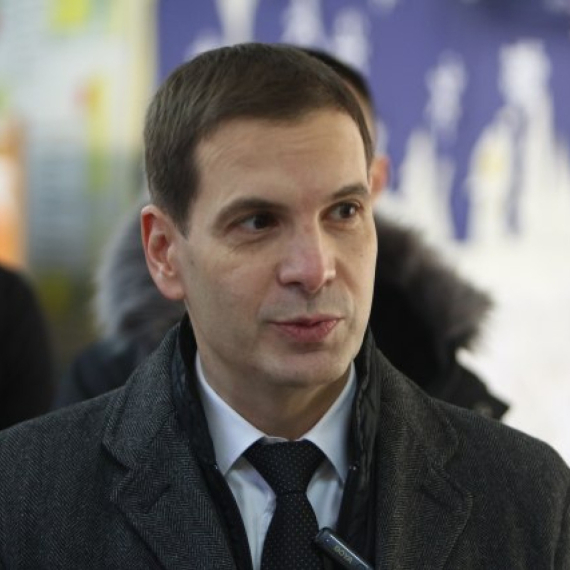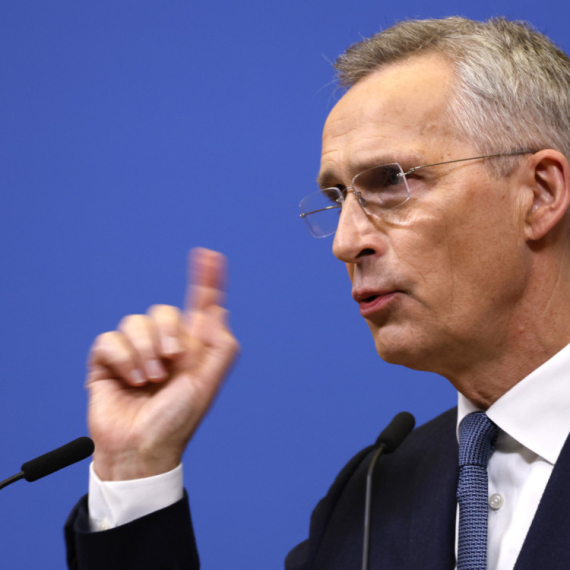"Trepca should not be condition for dialogue"
The EP rapporteur for Serbia has said he "hopes the first chapters in the EU-Serbia negotiating process would be opened during the first six months of 2015."
Tuesday, 20.01.2015.
09:13

"Trepca should not be condition for dialogue"
He said that the key points in the European integration process were the rule of law, fight against corruption, structural economic reforms, alignment with the European foreign policy and resumption of the process of normalization of relations between Belgrade and Pristina.When it comes to the rule of law, McAllister pointed to the part of the report dealing with the media, which stated that media freedoms had worsened a little and media ownership was not transparent.
McAllister also said that Serbia had to align with EU’s foreign policy and join the sanctions against Russia despite its deep cultural and historical ties with Russia.
On the other hand, he said, Serbia could use that privileged relationship during its chairmanship of the Organization for Security and Co-operation in Europe (OSCE).
He particularly welcomed the imminent resumption of dialogue between Belgrade and Pristina on the normalization of relations and the recent adoption of an Individual Partnership Action Plan with NATO.
Eduard Kukan, head of the European Parliament's delegation for relations with Albania, Bosnia-Herzegovina, and Serbia, agreed that Serbia had made progress and that there were problems relating to media freedoms, stressing that threats to journalists should be investigated.
It is inappropriate for Prime Minister (Aleksandar) Vucic to be pointing his finger at certain media, Tanja Fajon, head of the Slovenian delegation within the political group of Progressive Alliance of Socialists and Democrats, and a vice-president of the Social Democrats, said during the discussion at the EP.
Croatian MEPs raised the issue of statements made by the leader of the non-parliamentary Serbian Radical Party (SRS), Vojislav Seselj, demanding once again that the Serbian government should state their opinion on his recent statements.
At the request of Croatian MEPs, on November 27 last year, the EP already passed a resolution labeling Seselj statements as warmongering.
Leader of the right-wing Croatian Party of Rights Ruza Tomsic demanded that Serbia’s EU accession be made conditional on resolving the dispute with Croatia regarding the border on the Danube.
Tomsic and several other Croatian MEPs demanded that Serbia should immediately release Veljko Maric, member of the Croatian National Guard who was sentenced to 12 years in prison before the special court in Belgrade for war crimes against Serb civilians in Grubisno Polje.
According to the Serbian prosecution’s indictment, during operations in September and October 1991, the Croatian army carried out several organized attacks and plundered and burned more than 30 Serb villages in that region of Croatia.
Serbia has given itself the right to prosecute Croatian citizens for crimes committed on the Croatian soil, which represents a violation of our sovereignty, said Tomasic.
Tomasic made the statement despite the fact that in October 2006, Serbia’s and Croatia’s prosecutor’s offices for war crimes signed an agreement on cooperation in criminal prosecution of perpetrators of war crimes and crimes of genocide.
The majority of MEPs expressed their support for McAllister’s draft report, which, after amendment submission and two rounds of discussion next month, should be finally adopted at an EP plenary session in March.
"Trepca should not be condition"
David McAllister also aid on Monday that Serbia "should not insist on Kosovo abandoning the idea of nationalizing the Trepca mine as a condition for the dialogue on the normalization of Belgrade-Pristina relations.""I heard before the session that Serbia said it would suspend participation in the high-level political dialogue if the Kosovo government nationalizes Trepca," McAllister told members of the EP Foreign Affairs Committee
If the news is true, it is most unfortunate, the EP rapporteur said, stressing that the dialogue with Pristina is one of the key conditions for Serbia's progress in the European integration process.
The Belgrade-Pristina dialogue, which was suspended for nearly ten months due to elections in Kosovo and the six-month negotiations on the new government, is scheduled to resume on February 9 at the office of EU High Representative for Foreign Affairs and Security Policy Federica Mogherini in Brussels.
On January 15, the government of Kosovo adopted amendments to the law on public enterprises, which should have enabled it to take over 100 percent of all ownership and management rights in the Mining, Metallurgical and Chemical Combine Trepca, and of some other companies.
The Serbian government reacted strongly to Pristina's intentions, warning them that it will not allow the seizure of Serbia's public property, and Prime Minister Aleksandar Vucic "immediately informed Western partners (Quint countries) and the EU about it," Tanjug reported.
Vucic said Monday that the issue of property in Kosovo and Metohija should be opened as soon as possible "so Serbia would not end up having its property taken away from it overnight."
On Monday, the assembly of Kosovo adopted a draft on changes to the law on companies of special importance, while it was announced that Trepca would be the subject of a separate law.


























































Komentari 2
Pogledaj komentare